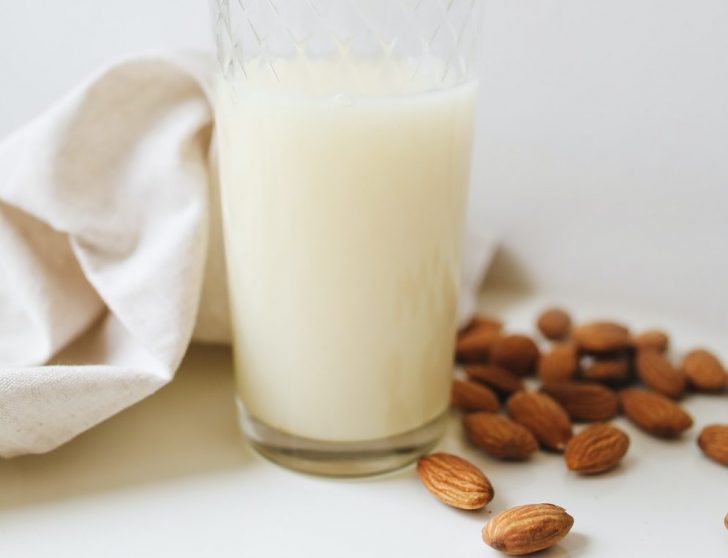
Nutritionists Break Down What You Need to Know About Almond Milk

The year of lockdown gave birth to many new trends worldwide, one of them being fitness. Many people began to actively change their lives while staying in social isolation by following a healthy diet and exercising regularly. Many also went onto share their healthy lifestyles on social media platforms such as YouTube and Tiktok. Interestingly, one aspect of this healthy lifestyle caught the eye of the masses: the dairy-free diet.
Though it was initially introduced in 2012 for people suffering from allergy and celiac disease, now the sales for non-dairy milk have gone up to a shocking 60%. Statistics also reveal that one out of every five Americans prefers dairy-free milk for health reasons.
Are these health nuts on the right track? Is dairy-free milk the way to go? Today, we’re looking at a specific type of dairy milk, i.e., Almond Milk.

Pexels | Almonds are great for you – but is almond milk better than regular milk?
Nutritional Value
Since almond milk only contains two ingredients; almonds and water, it has a relatively low protein and carb content compared to your regular milk. However, almond milk provides its consumers with good amounts of healthy fats but, this depends on the almond-water ratio in the milk. So, if one drink contains a good amount of almonds, chances are it has greater potential health benefits than drinks with higher water content.
Some almond milk brands have stepped it up a notch and included calcium in their product. If you’ve found calcium to be included in your almond milk, chances are so are Vitamin D and B12. Some companies even add protein powder to the mix, usually pea protein sourced from yellow split peas.

Pexels | Every good beverage chain now offers non-dairy options for its customers
Truly Beneficial – Or Just A Hoax?
Almond milk is generally targeted to people who are either suffering from medical conditions that prevent them from consuming regular dairy milk. Another target market consists of calorie-conscious individuals opting for a healthier choice.
The dilemma then arises when sweetened almond milk is placed into consideration. There are many companies that created flavored almond milk, including chocolate and vanilla. Naturally, to enhance the product’s flavor, sugar is added to it. A single cup of this almond milk provides around 12 grams of sugar, which is half of what is recommended sugar dose for women by the American Heart Association.

Pexels | Is your almond milk adding to or taking from your healthy lifestyle?
Bottom Line
Your choice boils down to how mindful you are when taking your pick. If you blindly go for the best tasting almond milk at your grocery store, you’re doing more bad than good to your body. Additionally, if you feel uncomfortable with store-bought, you can always make your own almond milk at home. This option will provide the best nutritional value for you.
More inHealthy Trends
-
`
Are Popular Diet Trends Actually Good for Your Heart?
Diet trends grab headlines every year, promising everything from glowing skin to dramatic weight loss. But when it comes to the...
July 30, 2025 -
`
Why Are Men Taller Than Women? New Genetic Study Finds Clue
For centuries, the average height difference between men and women has been noticeable—men generally stand about five inches taller. While environment...
July 23, 2025 -
`
How Upcycled Beauty Ingredients Are Reshaping the Industry’s Future
The beauty industry is going through a big shift — and it’s not just about trends. As waste problems grow and...
July 17, 2025 -
`
A Look Inside Faith Kipyegon’s Groundbreaking Mile Run in Paris
Last week in Paris, Faith Kipyegon returned to a place she knows well: Stade Sébastien Charléty. But this time, she wasn’t...
July 9, 2025 -
`
Dairy Is Making a Major Comeback — And Health Shoppers Are Loving It
Just a few years ago, dairy sat quietly in the back seat while plant-based alternatives took the spotlight. Now, it’s stepping...
July 4, 2025 -
`
Does Aging Cause Dental Problems?
Aging doesn’t automatically mean losing teeth or developing gum disease. In fact, older adults today are holding onto more of their...
June 25, 2025 -
`
How Upcycled Ingredients Are Shaping the Future of Cosmetics
What used to end up in bins or compost heaps is now finding a new life inside skincare bottles and beauty...
June 18, 2025 -
`
Rock Legend Rod Stewart Trains to Break Sprint Record at 80
Age isn’t slowing Rod Stewart down. Known worldwide for his legendary voice, stadium-filling tours, and timeless hits like “Maggie May”, the...
June 11, 2025 -
`
The Truth Behind Detox Diets – Health Boost or Risky Trend?
It’s hard to scroll through your feed without seeing someone sipping green juice with promises of instant energy, glowing skin, and...
June 3, 2025














You must be logged in to post a comment Login